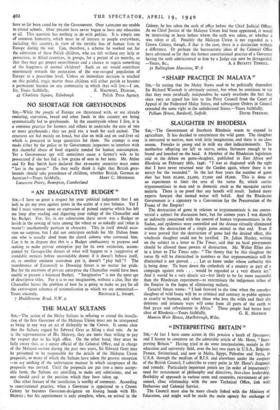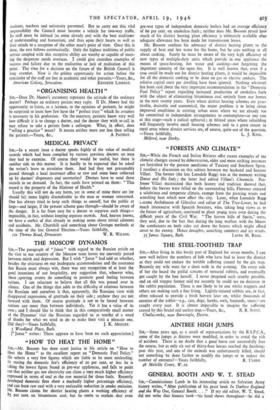" INTERPRETING BRITAIN "
SIR,—At last I have come across in this pension a batch of Spectators, and I hasten to comment on the admirable article of Mr. Henn, " Inter- preting Britain." Having tried to do some interpretation, mainly in the education and university field, over the last two years in U.S.A., Belgium, France, Switzerland, and now in Malta, Egypt, Palestine and Syria, in U.S.A. through the medium of B.I.S. and elsewhere under the auspices of the British Council, I subscribe to every point in Mr. Henn's diagnosis and remedy. Particularly-important points are (in order of importance): need for restatement of philosophy and directives, first-class leadership, flexibility of approach in various areas and countries, recruitment of per- sonnel, dose relationship with the new Technical Office, link with Embassies and Colonial Service.
The Council must also be more closely linked with the Ministry of Education, and might well be made the main agency for exchange of
students, teachers and university personnel. But to carry out this vital responsibility the Council must become a vehicle for two-way traffic. Its staff must be imbued (as some already are) with the best traditions of understanding and humanism, and thus open their hearts as well as their minds to a reception of the other man's point of view. Once this is done, the rest follows automatically. Only the highest traditions of public service coupled with this receptive ability are worthy or capable of meet- ing the desperate needs overseas. I could give countless examples of success and failure due to the realisation or lack of ,realisation of this point. The time for a decision on the future of the British Council is long overdue. Now is the golden opportunity for action before the remainder of the staff are hist in academic and other pursuits.—Yours, &c.,































 Previous page
Previous page